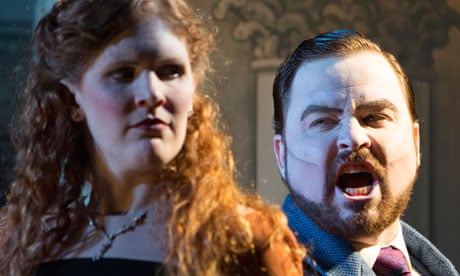Rodelinda was always an ambitious choice for Scottish Opera's new touring production. True, it only needs a cast of six and is tighter-knit dramatically than many Handel operas, but it's long, and soon feels longwinded if vocal performances aren't top-notch. Without a full orchestra (the score's been reduced to a hard-working trio of violin, cello and harpsichord) Handel's sumptuous instrumental colours are lost, which leaves the reams of da capo arias potentially monochromatic and puts more onus on the singers.
Plotwise, it's a typical Handelian court drama that director Chris Rolls vaguely hones around power politics and strained relationships; again, it's basically down to the performers to conjure up dramatic tension. This cast just about carries it off.
There's some beautiful singing from Sarah Power as Rodelinda: the Irish soprano has an easy, natural voice and an unfussy stage presence to match. Sioned Gwen Davies is good fun and sturdy-voiced as the sassy Eduige, and the two countertenors – Andrew Radley as the usurped king, Bertarido, and Reno Troilus as his nervous counsellor Unulfo – are both strong. It's disappointing that the baddies (Richard Rowe's Grimoaldo, Andrew McTaggart's Garibaldo) lack intrigue and vocal clout, and if there's a theatrical equivalent of literature's Bad Sex award, it should go to the fumblingly dire act one encounter between Garibaldo and Eduige.
The band holds its end up brilliantly, with bags of character from violinist Gabi Maas. But the score could be trimmed a bit, especially towards the end, and Rolls never quite clinches the yo-yo pacing between recitatives and reflective arias. It's odd, too, that he suddenly injects a sense of humour in the final scenes, when dagger wounds start spouting comedy blood. Up until then it's a fairly po-faced take that's held up by some graceful singing.

Comments (…)
Sign in or create your Guardian account to join the discussion